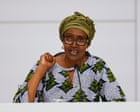
In the face of evolving global dynamics, recent updates reveal significant progressions and challenges in international relations and humanitarian efforts. This article aims to provide a clear and thoughtful reflection on current events that are reshaping global landscapes.
The ongoing challenges in fighting the HIV epidemic have taken a dire turn following the decision by former US President Donald Trump to significantly curtail funding for Pepfar, the US global AIDS response program. UNAids executive director, Winnie Byanyima, has expressed profound concern over these cuts, foreseeing a significant increase in HIV infections and AIDS-related deaths globally. Byanyima’s comments highlight the potential consequences of diminishing support and the urgent need for continued international cooperation and funding.
In a different part of the world, a tragedy unfolded in Zambia, where two tourists were tragically killed by an elephant during a walking safari. The incident underscores the critical need for stringent safety measures and the importance of respecting wildlife habitats while promoting sustainable tourism practices.
Meanwhile, in El Salvador, reports have emerged concerning the treatment of Kilmar Ábrego García during his custody. Claimed to have been subjected to harsh conditions at the Terrorism Confinement Center, the legal and human rights dimensions of his case continue to develop in US courts. Contrarily, El Salvador’s President, Nayib Bukele, has publicly disputed these allegations, further complicating the narrative and calling for a deeper investigation to ascertain the facts.
Additional reports have surfaced concerning the untimely discovery of two men who passed away in a disheveled residence in Sydney. Police investigations are ongoing to determine the timeline and circumstances, as concerns for community welfare and public health are being addressed.
On the diplomatic front, President Donald Trump has engaged in bilateral talks with Ukrainian leader Volodymyr Zelenskyy following intensified hostilities in Ukraine. The discussions come amid stalled US military aid to Ukraine, reflecting the delicate balance of geopolitical strategies and humanitarian aid in conflict regions.
In a noteworthy diplomatic move, Russia has recognized the Taliban’s government in Afghanistan. This recognition marks Russia as the first country to officially establish formal ties with the Taliban since their return to power in 2021. The decision signals shifts in regional alliances and presents a new chapter in international relations with Afghanistan.
Amidst these global developments, prominent football agent Jonathan Barnett faces serious allegations in an American lawsuit involving grave charges. These legal proceedings, underscored by claims of human trafficking and abuse, highlight ongoing global challenges in addressing and resolving issues of human rights and legal accountability.
In Turkey, President Recep Tayyip Erdoğan has vocalized criticisms against Israeli Prime Minister Benjamin Netanyahu, reflecting ongoing tensions and the complexities of Middle Eastern politics. Erdoğan’s remarks emphasize Turkey’s stance and commitment to advocating for justice and opposing oppression in the region.
These multifaceted events underscore a world in flux, where humanitarian challenges, diplomatic engagements, and legal accountability remain central to shaping the future of global societies. As the world responds to these developments, the importance of collaboration, empathy, and informed action becomes ever more vital.
Source: {link}
